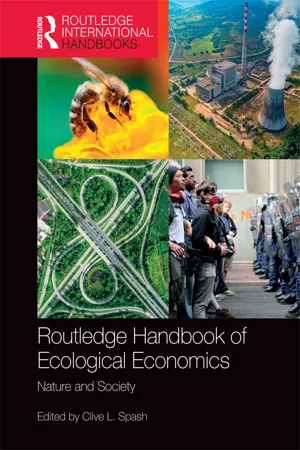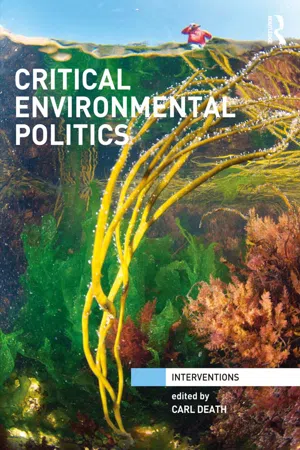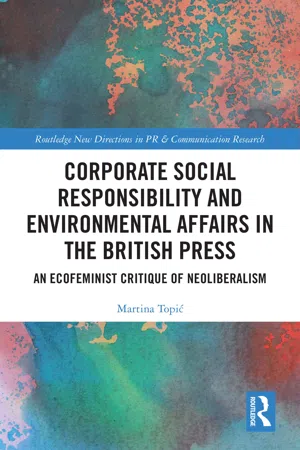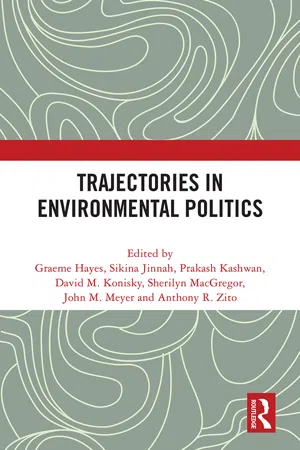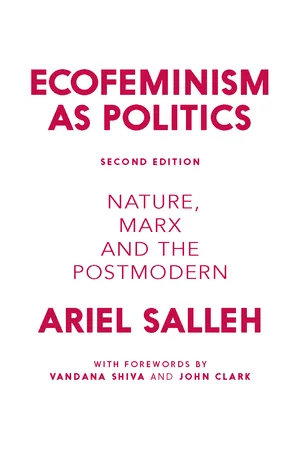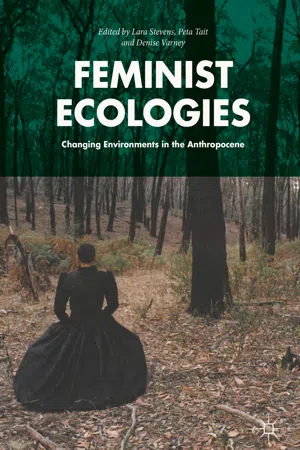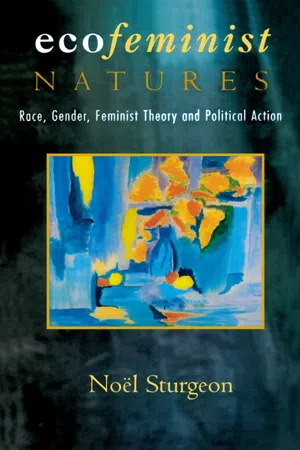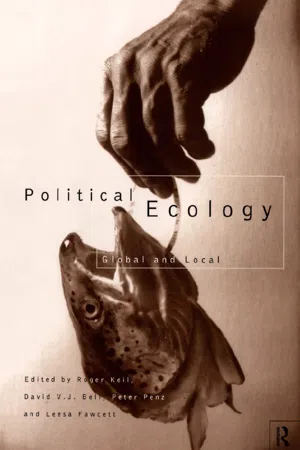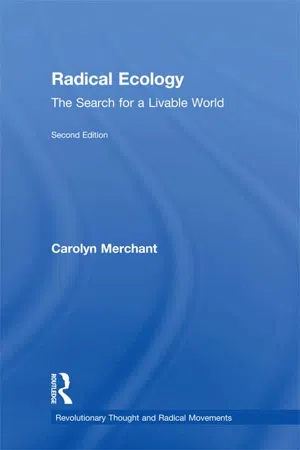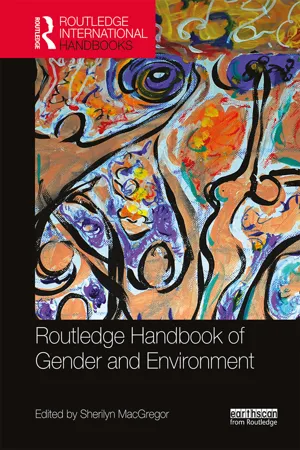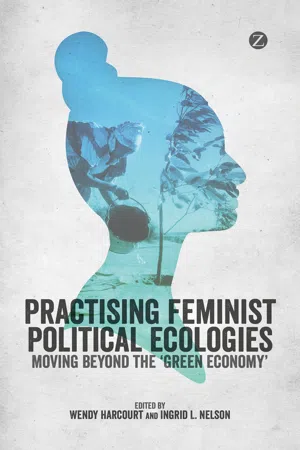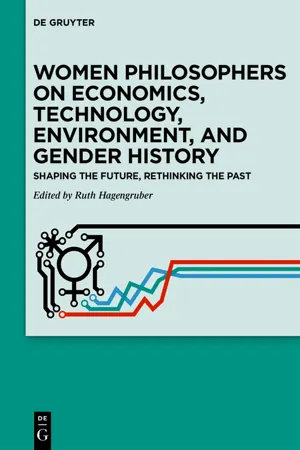Politics & International Relations
Eco Feminism
Ecofeminism is a social and political movement that links the exploitation of women and the environment, emphasizing the interconnectedness of gender and ecological issues. It critiques the patriarchal structures that perpetuate both environmental degradation and the subjugation of women, advocating for a more holistic and sustainable approach to addressing these interconnected challenges.
Written by Perlego with AI-assistance
Related key terms
12 Key excerpts on "Eco Feminism"
- eBook - ePub
Routledge Handbook of Ecological Economics
Nature and Society
- Clive L. Spash, Clive L. Spash(Authors)
- 2017(Publication Date)
- Routledge(Publisher)
5 ECOFEMINISMAriel SallehIntroduction
Ecological feminism is sometimes understood as a subset of social ecology. This is true in as much as ecofeminism addresses the interaction of social and natural processes. However, it would be false to suggest that ecofeminism derives from social ecology, or from deep ecology, or eco-Marxism [Chapter 6 ]. Ecological feminism is sui generis; its first premise being that society–nature relations in the dominant global economy are fundamentally sex-gendered in both material and ideological senses. In this respect, ecofeminism takes a methodological quantum leap beyond other political frameworks. Ecofeminism is also distinct from liberal and socialist feminisms, since these perspectives focus rather uncritically on the pursuit of equality. Ecofeminists are not looking for an equal slice of a toxic pie. Attention to the positive and negative implications of sex-gender difference is prioritised by ecofeminists, before attending to an equality that simply reinforces Eurocentric masculinist values as the universal norm. Likewise, respect for the principle of difference as cultural autonomy joins ecofeminism and postcolonial concerns. Further, the framing of liberal and socialist feminisms has been anthropocentric, whereas ecofeminism is oriented towards oikos and the interconnection of all life on Earth.Historically and geopolitically, men’s control of women’s embodied fertility has been an economic imperative. Accordingly ecofeminism reflects women’s experiences of everyday care-giving labour. More generally, however, when work involves the reproduction of living cycles, whether in the metabolism of nature-at-large or in human bodies-as-nature, people—men or women—readily learn how sustainability and justice fit together. Care-giving means facilitating living metabolic transfers using complex skills and a precautionary ethic. For those exposed to this empirical vantage point, social and ecological crises are clearly linked to competitive sex-gendered attitudes, embedded in and reinforced by the political economy of international institutions. While patriarchal domination has a ten-thousand-year history, capitalist modernisation does little to rectify it. - eBook - ePub
- Carl Death(Author)
- 2013(Publication Date)
- Routledge(Publisher)
10 FeminismErika CudworthIntroduction
Since the early 1970s, a distinct strand of feminist theorizing and activism has explicitly linked human relations with the ‘environment’ to gender (and other) inequalities. Ecofemi-nism emerged from a critique of both sexism in the green movement (Doubiago 1989) and an absence of awareness about ‘environmental’ questions in feminist politics (Plumwood 2004: 43; Salleh 1984). Ecofeminists draw on and develop various elements of both ecological and feminist politics however. For example, like deep ecologism (see McShane, this volume), most ecofeminists conceptualise human relations with ‘nature’ as a form of domination. They also can be understood to provide a version of social ecology in which the domination of nature is interrelated to intra-human social hierarchy and difference based on gender, race and class amongst other formations. Here, they are influenced by the work of ecosocialists and postcolonial scholarship. The influence of feminist politics is perhaps the strongest, however, as ecofeminists deploy concepts of gender domination and inequality in thinking about labour, production, knowledge and power and interrogate our ideas of what it means to be human.This chapter focuses on the concepts and theories of ecofeminism, or ecological feminism, and its influence on environmental politics. It proceeds through three sections. First, the core ideas section considers various influences and approaches in ecofeminist analysis; the use of ‘patriarchy’ to explain the domination of ‘otherised’ groups (including women, non-human animals and non-human life), and ideas of ‘linked dualisms’ and ‘multiple oppressions’, which have been used to explain how the human treatment of the environment is bound up with (or ‘intersectionalised’ by) social inequalities. The section on key thinkers maps the different strands of ecofeminist thinking in focusing on some influential thinkers from different geographic and disciplinary locations. The final section will consider the critical potential of ecofeminism and argue that in emphasizing the intersectionalised qualities of exploitation and exclusion, ecofeminism has provided an important critique of other kinds of political ecologism. - eBook - ePub
Corporate Social Responsibility and Environmental Affairs in the British Press
An Ecofeminist Critique of Neoliberalism
- Martina Topić(Author)
- 2021(Publication Date)
- Routledge(Publisher)
2 EcofeminismTheory, issues and advocacy
DOI: 10.4324/9781003091592-2Ecofeminism is a feminist movement “and current of analysis that attempts to link feminist struggles with ecological struggles” (Sandiland, 1999 , p. xvi), and as such ecofeminism focuses on the duality of oppression of women and Nature (Mallory, 2012 ) by the ideology of hegemonic masculinity and patriarchy, both of which are also linked to capitalism (von Werlhof, 2007; Merchant, 1992 ; Stoddart & Tindall, 2011 ; Radford Ruether, 2012 ; Henderson, 1997 ; Maclaran & Stevens, 2018 ; Gaard, 1997 ; Ling, 2014 ; Warren, n.d. ; Đurđević & Marjanić, 2020 ). With this, ecofeminism becomes a movement that combines elements of radical feminism (focus on patriarchy and the domination of women and Nature) and socialist feminism (opposition to capitalism) (Topić, 2020d ). Even though it is often said there are as many ecofeminisms as ecofeminists, the common definition of ecofeminism is an anti-hierarchical and anti-capitalist movement that works on a global scale as evidence on a wide range of activism across the globe have demonstrated so far (Griffin, 2020 ; Fakier & Cock, 2018 ; Holy, 2007 ; Shiva & Bandyopadhyay, 1986 ; Jain, 1984 ; Bandyopadhyay, 1999 ; Moore, 2011 ; Mishra et al., 2021 ; Green Belt Movement, n.d.).In other words, as opposed to other feminisms that are either overly dogmatic or overly white and Western to apply to everyone, ecofeminism indeed can be (and has been) used in a variety of contexts. Therefore, as already emphasised, ecofeminism encompasses elements of radical feminism (which sees women as inherently different than men and predominantly because of the gendered socialisation process and thus focuses on criticising patriarchy) and socialist feminism (due to its focus on capitalism and hierarchy as well as focus on class differences and the difference between the Global North and the Global South and the accompanying oppression) (Topić, 2020d ). The fundamental view of ecofeminism is that the reason for oppression lies in the dichotomy of culture vs Nature where men are associated with culture and women with Nature, which then ends up in oppression of both women and Nature. The idea developed from the view that humans separated themselves from Nature and belong to the culture, which is seen as an anti-thesis to Nature (Holy, 2007 - eBook - ePub
- Graeme Hayes, Sikina Jinnah, Prakash Kashwan, David M. Konisky, Sherilyn Macgregor, John M. Meyer, Anthony R. Zito, Graeme Hayes, Sikina Jinnah, Prakash Kashwan, David M. Konisky, Sherilyn Macgregor, John M. Meyer, Anthony R. Zito(Authors)
- 2022(Publication Date)
- Routledge(Publisher)
Plumwood 2004 , p. 44, 46). This lens is feminist because it makes visible the gender norms, relations and asymmetries that shape human experiences of environmental change, and illuminates how these influence the commitments of gendered people participating in green enterprises in private and public spheres. It is a lens that is fine-tuned to detect unequal divisions of labour and duty, and to magnify dangers of political co-optation in a neoliberal age. It is a lens that tries to bring into focus a vision of a gender-just and sustainable society somewhere in the distance.Although it had already been developing in other publications since the 1970s, the green political theory of ecofeminism was first elaborated in this journal by Mellor in volume 1, issue 2 in 1992. A few years later, it was praised for being a materialist theory that ‘suggests nothing less than a fundamental rethink of green politics’ (Barry 1998 , p. 150). And yet it has been at the margins of environmental politics scholarship ever since. Moving into the third decade of the 21st century, not only are ecofeminist theoretical contributions largely absent from the literature on sustainable materialism, but its key analytical insights into intersectional power relations and questions about the distributions of time, work and duty – who does what in the reproduction of daily life – are rarely addressed. Troubled by the erasure of ecofeminism from contemporary scholarship on topics about which it has been concerned for nearly five decades, my aim is to correct an injustice that is intellectual, political and material. In so doing, I join a growing number of feminist and ecofeminist scholars who are calling out the caricatures and erasures found in much recent literature in the environmental (post)humanities; Ahmed names this a form of ‘citational politics’ (Hamilton and Niemanis 2018 , Ahmed 2013 , Ahmed 2008 - eBook - ePub
Ecofeminism as Politics
Nature, Marx and the Postmodern
- Ariel Salleh(Author)
- 2017(Publication Date)
- Zed Books(Publisher)
What happens is that the terrain of ecofeminism is reduced to a specific feminist controversy over whether women’s politics should be guided by a principle of ‘equality’ modelled on male-devised institutions or by a principle of gender ‘difference’. Accordingly, exchanges between ecologism and socialism are characterised by Dobson as ‘a debate between ways of thinking and acting’, while ecofeminism is ‘a debate within a way of thinking and acting’. In other words, ecofeminism has no wider contribution. 30 This has two effects: one is to miss the implication of ecofeminist epistemological critique for eurocentric culture at large; and the second is to disregard the value of ecofeminist exposés of undemocratic masculinism in the grassroots green movement itself. To ecofeminists, all ecologism appears light-green, partial and particularistic. Thus, according to Petra Kelly, men speak of peace as ‘paying dividends’, while ecofeminists think that nonviolence ‘means that men are reconciled to themselves, with their own species, with nature and the cosmos … disarmament means exposing one’s own vulverability’. 31 Steven Yearley’s interpretation of women’s ecopolitics also leads to their containment. He comments that the environmental movement has special reasons for being international in scope because threats readily flow across sovereign boundaries. Feminist issues on the other hand, while encountered in a variety of societies, are characterised as turning inward with a politics of the personal – employer, husband - eBook - ePub
Feminist Ecologies
Changing Environments in the Anthropocene
- Lara Stevens, Peta Tait, Denise Varney, Lara Stevens, Peta Tait, Denise Varney, Lara Stevens, Peta Tait, Denise Varney(Authors)
- 2017(Publication Date)
- Palgrave Macmillan(Publisher)
ally Marxist, theories of social domination and transformation.Generally speaking, what distinguishes ecofeminist thinking from an environmentally concerned femi nism, or, conversely, a pro-feminist environmentalism, is the claim that there is some kind of inherent or structural connection between the patriarc hal domination of women (and, in the view of some theorists, other socially oppressed groups) and the ecologically destructive exploitation of the earth. However they may differ in grounding that connection, in asserting its significance all ecofeminists necessarily reaffirm, to some extent, that link between women and nature which liberal and socialist feminists from Simone de Bea uvoir onwards have been at pains to sever. According to de Beauvoir’s powerful critique in The Second Sex (1968 ), the association of Woman and Nature was a key element in patriar chal ideology which served to legitimize women’s exclusion from the public sphere and their confinement to the realm of ‘mere’ reproduction, centred on the home. Full equality, for de Beauvoir, was premised upon women’s liberation from this emersion in the reproductive sphere through the transcendence of their own sexed bodies, for it was above all women’s capacity to give birth which underlay both the feminine imaging of Nature and the biologistic reduction of Woman to womb. While de Be auvoir’s analysis of the ambivalences underlying men’s view of both women and nature was insightful, as Mell or observes, she remained ultimately uncritical of male-dominated culture and dismissive of ‘the problems of embodiment ’ (Mellor 1997 : 79). Shulamith Fire stone, writing 20 years later than de Bea uvoir, was equally insistent that the emancipation of women necessitated their liberation from the womb—a project which in her view was now potentially realizable through the technologization of reproduction and the socialization of child-rearing in the context of a thoroughgoing socialist transformation of human relations (Firestone 1970 ). For women (and indeed men) whose fem inism had been forged on the anvil of this rationalist egalitarian tradition—whether or not they subscribed fully to Firest one’s extreme techno-socialist optimism, and even if they had in the meantime developed a less hostile attitude to motherhood—the ecofeminist revaluation of the association between women and nature looked like a politically dangerous fall back into the mirror of - eBook - ePub
Ecofeminist Natures
Race, Gender, Feminist Theory and Political Action
- Noel Sturgeon(Author)
- 2016(Publication Date)
- Routledge(Publisher)
5 Ecofeminist Natures And Transnational Environmental Politics DOI: 10.4324/9781315865874-6In previous chapters, I have argued that a tension exists between ecofeminist definitions of diversity that privilege differences based on U.S. racial categories, and notions of diversity based on “international” difference. In this chapter, I will decenter the U.S. context in order to consider the deployment of ecofeminist conceptions of race and gender within a transnational context. I want to ask about their political results within a particular historical, disciplinary, and political context in the early 1990s in order to explore the conditions under which “strategic essentialisms” operate, and to generate ways of assessing their effects. I will start by sketching two interrelated contexts. One is the field of development studies, which, from 1970 to 1990, had experienced shifts from “development” to “women in development” to “women, environment, and development.” The second context is a phenomenon I will call the “globalization of environmentalism,” or the hegemonic contests over the meaning and use of “environmentalism” within a post-Cold War transnational political arena. Finally, I will look at a specific example of the deployment of an implicitly ecofeminist discourse as a mobilizing tool by an organization called WEDO, or Women’s Environment and Development Organization, which was founded in 1990 to orchestrate a “women’s voice” within UN deliberations over the intersection between environment and development. What I want to show here is the way in which “ecofeminism,” rather than being a fixed group of movement actors or organizations, or even a set of circumscribed theories or analyses, is a political intervention into dominant development discourses that, by the end of the 1980s, were tied to a hegemonic environmental discourse. What ecofeminism allows in this context is a feminist intervention into changing development discourses as well as a location within which coalitions between southern and northern feminists can take place. - eBook - ePub
Political Ecology
Global and Local
- David Bell, Leesa Fawcett, Roger Keil, Peter Penz(Authors)
- 2005(Publication Date)
- Routledge(Publisher)
Ecofeminism may not be biologically reductionist, but it is often essentialist; its constructions of women and nature, even in some of the most sophisticated accounts, are based on claiming a very limited notion of ‘identity’ for women and nature, and are based on finding some specificity for feminism in relation to ecological struggle (and vice versa). Women and nature are constructed, in ecofeminism, through their particular connection; this particularity can be named ‘difference’, and is a very limiting, and ultimately ineffective, political representation. 7 The problem of difference is inherent in ecofeminists’ reliance on dualism as an analysis of power and oppression. If, their logic goes, male separation from nature, or men’s control of reproduction, or patriarchal constructs consigning women and nature to a lesser status, are the source of the problem, then the solution—in some form—centres on the creation of alternatives based on this subaltern experience. To King, women can and should choose not to ‘sever the woman/nature connection’. To Mellor, ‘a feminist green socialism must be underpinned by the values that have hitherto been imposed upon women: altruism, selfless caring, the desire to help other people realise their potential’ (1992:237). 8 Here, women’s specificity vis a vis nature is, somehow, the form of subaltern experience which reveals oppression; this is, thus, a feminist politics based on women’s difference. Here also, it is the specificity of nature, as that which is oppressed by culture, that is seen to be the object to be revealed in women’s struggles over nature; this is, thus, a politics based on women’s ability to recognize nature’s difference (implied: men’s inability) - eBook - ePub
Radical Ecology
The Search for a Livable World
- Carolyn Merchant(Author)
- 2012(Publication Date)
- Routledge(Publisher)
32A socialist ecofeminist movement in the developed world can work in solidarity with women's movements to save the environment in the underdeveloped world. Using a partnership ethic, it can support ecological actions that also promote social justice. Like cultural ecofeminism, socialist eco-feminism protests chemical assaults on women's reproductive health, but puts them in the broader context of the relations between reproduction and production. It can thus support point of production actions such as the Chipko and Greenbelt movements in the Third World, protests by Native American women over cancer-causing radioactive uranium mining on reservations, and protests by environmental justice advocates over toxic dumps in urban neigh-borhoods.33Women and Development
Many of the problems facing Third World women today are the historical result of colonial relations between the First and Third Worlds. From the seventeenth century onward, European colonization of lands in Africa, India, the Americas, and the Pacific initiated a colonial ecological revolution in which an ecological complex of European animals, plants, pathogens, and people disrupted native peoples’ modes of subsistence, as Europeans extracted resources for trade on the international market and settled in the new lands. From the late eighteenth century onward, a capitalist ecological revolution in the Northern Hemisphere accelerated the extraction of cash crops and resources in the Southern Hemisphere, pushing Third World peoples onto marginal lands and filling the pockets of Third World élites. In the twentieth century, Northern industrial technologies and policies have been exported to the South in the form of development projects. Green Revolution agriculture (seeds, fertilizers, pesticides, dams, irrigation equipment, and tractors), plantation forestry (fast-growing, non-indigenous species, herbicides, chip harvesters, and mills), capitalist ranching (land conversion, imported grasses, fertilizers, and factory farms), and reproductive technologies (potentially harmful contraceptive drugs, sterilization, and bottle feeding) have further disrupted native ecologies and peoples. - eBook - ePub
- Sherilyn MacGregor, Sherilyn MacGregor(Authors)
- 2017(Publication Date)
- Routledge(Publisher)
Importantly, Agarwal’s critique, her analytical and methodological approach, and her lessons from India have provided a model for subsequent research in the gender and environment field. It is apparent from a thorough review of the academic literature that ideologically driven portraits of women’s connections to nature are now extremely rare in academic gender and environment research. In fact, the body of research that has been developed under the label of feminist political ecology offers a rich array of local case studies from all regions of the globe that continue to challenge any notions that women as women should be seen as either environmental victims or saviours. It is to this body of work that I now turn.The evolution of feminist political ecology
Feminist political ecology (FPE) emerged on the scene in the mid-1990s, arguably as a way to reclaim the feminist politics in environmental engagements and to redress the negative, essentialist reputation of cultural forms of ecofeminism. Whether or not (and how) FPE is connected to ecofeminism or whether it is a rejection of ecofeminist scholarship is beyond the scope of this chapter (see Rocheleau and Nimal 2015 for a review). The discussion in this section offers an overview of its evolution and central themes and concepts.To begin, no discussion of FPE is ever complete without meandering momentarily into political ecology itself, like a river artery to its source, as FPE is a subfield of political ecology and both perspectives evolved in intellectually integrated and similar ways. Political ecology (PE) is an analytical approach that interrogates the operations of power that define people’s unequal and differentiated access and control of resources at local, regional, and global scales. It came to the forefront of human geography in the 1980s, bringing political analysis to the task of understanding the links between environment and society. PE scholars argue that there is no transcendent adaptive or ecological order that can one-sidedly affect human populations, but an ecological system in which capital commodifies and commercializes every aspect of nature and re-configures human communities (Peet et al. 2011; Watts 2015). From its inception, PE scholarship has made deliberate efforts to express how nature and society are understood to co-produce one another, referred to as ‘socio-natures’(Castree and Braun 2001). For example, for people involved in environmental justice movements, Loftus says ‘the environment is something lived - eBook - ePub
Practising Feminist Political Ecologies
Moving Beyond the 'Green Economy'
- Wendy Harcourt, Ingrid L. Nelson, Wendy Harcourt, Ingrid L. Nelson(Authors)
- 2015(Publication Date)
- Zed Books(Publisher)
Feminism and the Mastery of Nature , London: Routledge.Read, P. (2000) Belonging: Australians, Place and Aboriginal Ownership , Cambridge: Cambridge University Press.Rocheleau, D., B. Thomas-Slater and E. Wangari (1996) Feminist Political Ecology: Global Issues and Local Experiences , London: Routledge.Salleh, A. (1997) Ecofeminism as Politics , London/New York: Zed Books/Palgrave.Passage contains an image 9 | Knowledge about, Knowledge with: Dilemmas of Researching Lives, Nature and Genders Otherwise Larissa Barbosa da Costa, Rosalba Icaza and Angélica María Ocampo Talero Introduction
What happens if we see social struggles as questioning our worldviews concerning lives, nature and genders? In this chapter, we reflect upon this question through our intellectual and personal travels through academic research. The three of us were invited to participate in the workshop that gathered together the authors who have contributed to this book, and as such we were offered the opportunity to reflect upon what we had learnt and what we had found inspiring in thinking about lives, nature and genders.The methodology that we followed was a free exchange of ideas led by three questions: • Is there a role for academia and for social movements when thinking about alternatives to the ecologically violent presents? • In which ways do our social locations (gender, class, ethnicity) play a role in the engagements we have developed in our research? • Which kind of research practices/perspectives/tools do each of us deploy to advance our understandings of social resistance to transforming ecologically violent contexts?Our conversation took place over three different days in May and June 20131 and was conducted mainly in English, but with Spanish and Portuguese coming into play when meanings were not easy to find in English as our lingua franca - eBook - ePub
Women Philosophers on Economics, Technology, Environment, and Gender History
Shaping the Future, Rethinking the Past
- Ruth Edith Hagengruber, Ruth Edith Hagengruber(Authors)
- 2023(Publication Date)
- De Gruyter(Publisher)
Environment, Power and Society (1971) pioneered notions of ecological engineering, economics, and environmental accounting. Women’s aspiration to live in balance with nature thereby waging a movement against mal- development, environmental degradation, global capitalization, and the need for indigenous cultures, economic values, and programs based on sustainability has found its voice in ecofeminism. Starhawk, a notable thinker on ecofeminism, challenges the idea of male dominated Western economies destroying nature and transforming the structures of power (in hands of males) while drawing parallels with nature and women as life giving forces thus placing them ( women and nature) at the center. Ecofeminism theorizes upon the recognition of connections between the domination of nature and women across the patriarchal society further locating these two entities with racism, colonialism, neo-colonialism, and class exploitation. Hence, earth as a feminist space becomes the central category of analysis in this context that encounters the nature-culture dualism. The devastation of earth has made the ecofeminist to rethink and reconsider the antithetical viewpoint of capitalism and science that stands in sharp contrast to the ‘green earth’. The green politics calls for structural changes in the society where feminist ethics binds together to create an ecotopia ( Ecology + Utopia) – i. e., green is ‘ Utopia’. This formulation further leads to the interrogations and debates that further raise questions and concerns like:1.Can nature, women, development, and science maintain a harmonious relation?2.If science/ technology and capitalism – a developmental necessity – are thought to be the major force causing the destruction of nature and women, how can an ecotopian world be created?In an attempt to address these questions, the paper formulates the discussion on Vandana Shiva’s ideas on ecocriticism, women and nature. Vandana Shiva, an Indian physicist and ecofeminist, founded the Research Foundation for Science, Technology and Natural Resource Policy that emphasizes on sustainable methods of agriculture. Shiva has articulated the complications caused by capitalist domination and provided adoptive measures and realistic solutions in Globalization’s New Wars: Seed, Water, and Life Forms (2005) and Earth Democracy: Justice, Sustainability, and Peace (2005). As an ecofeminist, Shiva in her article, “Empowering Women” remarks that sustainable and productive methods to agronomy can be attained by restoring the system of agriculture in India that is women-centered (Shiva 2004
Index pages curate the most relevant extracts from our library of academic textbooks. They’ve been created using an in-house natural language model (NLM), each adding context and meaning to key research topics.
